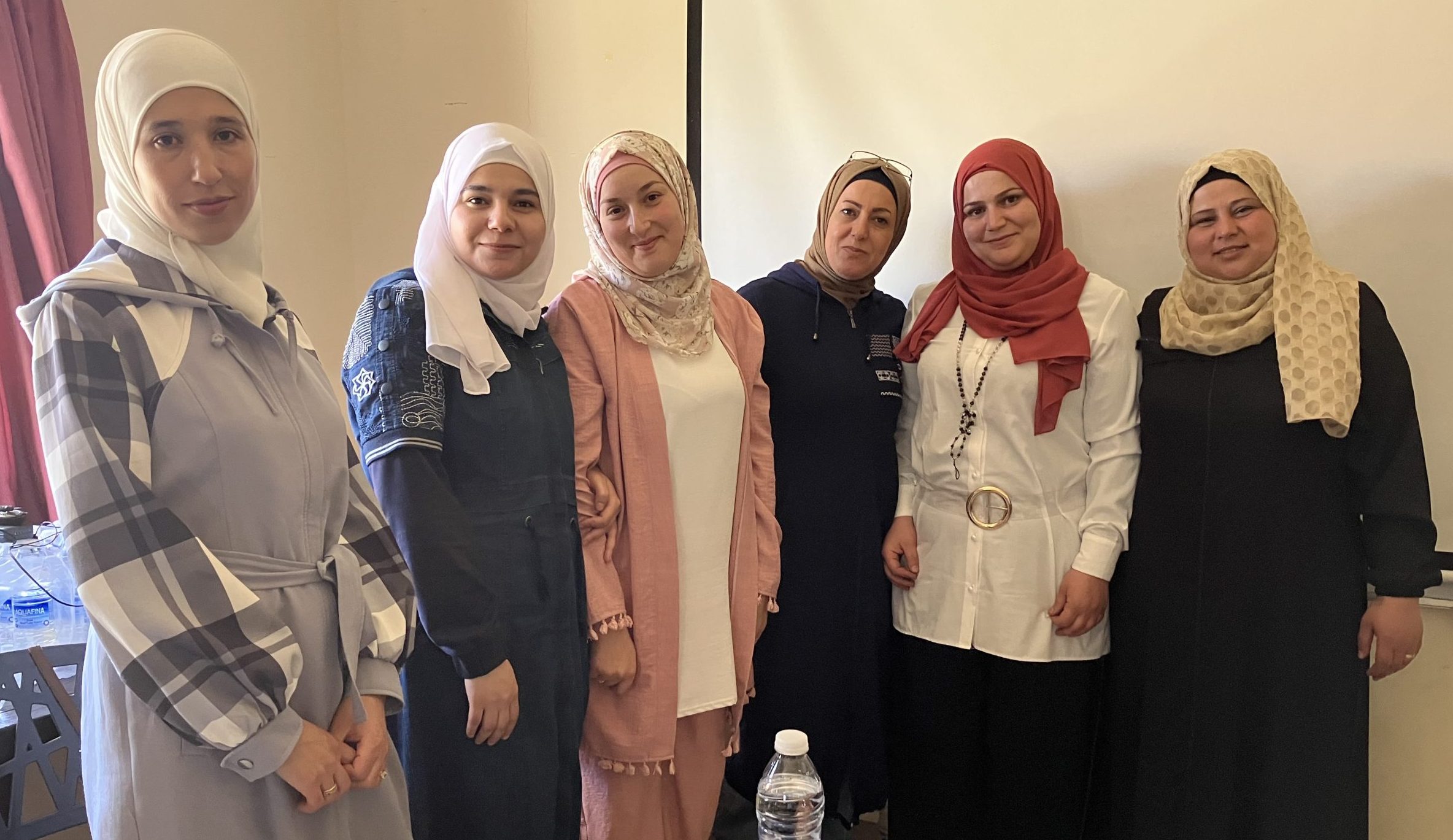
Some of the members of the Working Women group
Interview with a member of Beqaa’s Working Women group
14 November 2023
While visiting our learning site in Majdal Anjar in Lebanon’s Beqaa Valley, the ReBUILD for Resilience team met with a group of Syrian close-to-community informal health workers (you might remember our study with the refugee women and others earlier in the project). With help from our American University of Beirut team and the Women Now for Development NGO [opens new tab] the women have formed their own support group – Working Women – a participatory community which aims to support and advocate for local working women in Majdal Anjar (more on that group here).
One of the group spoke to us about her life in Lebanon, her hopes for the future, and plans to spread Working Women to other towns and villages in the area. For the purpose of this interview we are calling her Amal (not her real name – it means ‘hope’).
Hi Amal, can you tell me about your life here in Lebanon?
I am a Syrian refugee living in Arsal, a village near to the Syrian border and a two-hour drive from Majdal Anjar. Arsal is a challenging place to live. It is mostly populated by Syrian refugees who cannot leave for fear of being arrested, and we experience a lot of political unrest. There are big gaps in health and education services there and the deplorable economic situation in Lebanon is a problem for us all – there is a lot of child labour as a result.
I have a legal permit to live but not work in Lebanon, however, my husband does not have a permit to even be here. This has a big negative impact on our family and our finances. My husband cannot risk working – if caught he would be sent back to Syria and conscripted into the army – and so I must work as well as look after our family which is a big burden.*
What everyday challenges do you face as a woman and a refugee here in Lebanon?
We are a family of six – four children, my husband and myself. I am the only source of income for our family as my husband cannot work. I volunteer at an international NGO but it is not regular income – just reimbursement for travel expenses when I go to refugee camps to deliver health education. Our poor economic situation is really impacting on our mental health and wellbeing. Also, my children are not getting a good education which is another source of constant worry and stress for me.
You are involved with Working Women – can you tell us about your involvement and what it means to you?
I was invited to the first meeting and workshop with AUB last year (my friend who was also living in Arsal came with me but has since gone back to Syria). That led to a connection with Women Now and with Mariam and Ola who work there. Until today I had not actually met them face-to-face – always online as Arsal is so far from Majdal Anjar and it is very difficult for women there to get involved. However, I’m trying to take all of the knowledge I have gathered online and transfer it to a new group for women in Arsal. It will be a parallel Working Women group. I have recruited 8 other women so far and we hope to attract more. When we begin to deliver training to them I will do my best to transfer what I have learned. The main focus for us is to secure job opportunities for women in Arsal and to improve their economic situations, so I hope that the women in the parallel group will be successful in providing support and work for other women. I want to stay in contact with the group in Majdal Anjar while having an impact and making a positive change in Arsal. And if we are successful maybe the model can be copied in different places in Lebanon.
What do you hope for the future for your family?
My aim is to leave Lebanon so my children can have a better education than they are receiving now. I would like my eldest son to become a doctor. I am pushing him and supporting him in his education but I cannot provide him with that opportunity while we are living in Arsal. It is a big source of stress and worry for me.
Thank you, Amal, and good luck
*It is estimated that 80% of Syrian refugees in Lebanon do not have residency documents. This is a direct result of the Lebanese government banning the United Nations High Commission for Refugees (UNHCR) from registering Syrians arriving in Lebanon after 2015. Refugees are also not granted work permits. Men in particular cannot risk being caught working for fear of being returned to Syria.
Further information
Blog post: There’s more on the workshops and process that led to the establishment of the Working Women support group here.
Blog post: Women, mothers, wives, refugees, health workers, activists: the roles of close-to-community health workers in Lebanon
Blog post: Read an overview of our visit to Majdal Anjar here.
Blog post: In 2022 ReBUILD responded to a call for written evidence to the UK government’s International Development Committee on the subject of UK aid for refugee host countries. Our submission focused primarily on Syrian refugees in Lebanon – you can read an adaptation of that submission by Dr Fouad Fouad here.